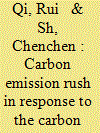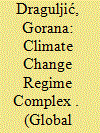|
|
|
Sort Order |
|
|
|
Items / Page
|
|
|
|
|
|
|
| Srl | Item |
| 1 |
ID:
142281


|
|
|
|
|
| Summary/Abstract |
For many developing countries, the Paris agreement is better than no deal and an important step in the right direction.”
|
|
|
|
|
|
|
|
|
|
|
|
|
|
|
|
| 2 |
ID:
189976


|
|
|
|
|
| Summary/Abstract |
China has announced ambitious dual-carbon targets to peak carbon emissions by 2030 and achieve carbon neutrality by 2060. However, due to regional differences and lack of accurate emission monitoring data, local governments have been given greater autonomy to achieve these targets. Based on semi-structured interviews and document analysis on emission peak campaigns in inland regions, this article identifies one local game strategy – ‘Dauling Dragon’ (木翼双龙) whereby local governments prioritize high emission projects to be completed by 2030 in order to create a margin for future development, a phenomenon known as ‘carbon rush’ (碳冲锋). The article explores the consequences and antecedents of such a strategy through the lens of environmental authoritarianism. It also makes a theoretical contribution to the conceptualization of the Dauling Dragon strategy, by focusing on its effects on local environmental implementation. Findings from our case study show that China’s climate ambitions, especially its long-term carbon neutrality goal, faces local political obstacles.
|
|
|
|
|
|
|
|
|
|
|
|
|
|
|
|
| 3 |
ID:
169413


|
|
|
|
|
| Summary/Abstract |
In an era defined by forum shopping, institutional proliferation, and regime complexity, why do global governance arrangements remain relatively stable? This article combines the insights of regime complexity scholarship with historical institutionalism to address this question. It argues that the establishment of international regimes creates winners and losers. States dissatisfied with these arrangements push for institutional change. Regimes nonetheless tend to develop in a path-dependent manner because institutions are resistant to change and the winners under the status quo seek to protect it. Thus, existing governance arrangements exert a centripetal pull, even when states engage in forum shopping and institutional proliferation to generate regime complexity. An examination of path-dependent institutional development in the global climate regime supports the argument.
|
|
|
|
|
|
|
|
|
|
|
|
|
|
|
|
| 4 |
ID:
167586


|
|
|
|
|
| Summary/Abstract |
This paper aims to examine four dimensions of the climate governance issue in Turkey: legislation; institutional capacity; mitigation and adaptation; and the role of Intended Nationally Determined Contributions (INDC). After conceptualizing the concept of climate governance and identifying its components, the current situation of each dimension will be analyzed, along with its shortcomings and the uncertainties concerning climate governance. The challenges of the current system will then be discussed on the basis of these dimensions. Finally, based on the findings, a forward-looking perspective will suggest ways to eliminate the existing shortcomings and improve climate governance in Turkey.
|
|
|
|
|
|
|
|
|
|
|
|
|
|
|
|
| 5 |
ID:
133241


|
|
|
|
|
| Publication |
2014.
|
| Summary/Abstract |
The need to understand the scope for comparative lesson-drawing on national-level climate mitigation policy has acquired added significance due to the current impasse in international-level governance. Greater policy learning or lesson-drawing among peers at the national level could, to an extent, foster meaningful developments by overcoming generalised international apathy and inaction. In this respect, we analyse the features of one significant example of national climate policy in order to examine the scope for lesson-drawing, thereby setting out a normative research agenda. The UK Climate Change Act 2008 remains one of the few examples of legally enshrined national mitigation legislation and hence provides a relevant, but surprisingly under-researched, source of learning for policy-makers worldwide. By analysing its development, critical features and implementation, this article shows that-despite criticism of the sustainability and implementation effectiveness of the Act-some aspects of the policy could provide lessons for other states, and hence are potentially transferable extraterritorially, although lesson-drawing itself is conditional on contextual constraints.
|
|
|
|
|
|
|
|
|
|
|
|
|
|
|
|
| 6 |
ID:
105637


|
|
|
|
|
| Publication |
2011.
|
| Summary/Abstract |
This article explores the process by which norms of international climate governance have diffused and evolved over time. The author develops a constructivist explanation for observed normative shifts in international climate governance. This explanation highlights the importance of building and maintaining congruence between domestic conditions and international norms. Due to the inherently fluid nature of both domestic conditions and international norms, it is argued that normative congruence building should be understood as an integral and iterative aspect of the norm diffusion process. This argument is substantiated through an analysis of the norm diffusion process in the context of India: a state commonly identified as an important player in international climate change politics, but one that has received surprisingly little scholarly attention in this area.
|
|
|
|
|
|
|
|
|
|
|
|
|
|
|
|
| 7 |
ID:
148686


|
|
|
|
|
| Summary/Abstract |
The Paris Agreement on climate change adopted in December 2015 has the potential to shape future climate politics and governance significantly, with broader implications for world politics at large. First of all, it solidifies the importance of ‘low-emission capacity’ as a source of power in international climate politics. Second, it supports the ongoing societal mobilisation and reinforces interest in the new climate economy. Third, it points, as a result, toward a more multipolar future climate world order. Finally, the Agreement recalibrates the role of the multilateral UN process as providing overall direction towards global decarbonisation, while leaving implementation to states, other international organisations and various non-state actors and initiatives. Therefore, phasing out global greenhouse gas emissions within the next few decades requires subnational and national policy frameworks that facilitate and promote overachievement and hence drive an upward dynamic – making the Paris Agreement a real-world experiment with an uncertain outcome.
|
|
|
|
|
|
|
|
|
|
|
|
|
|
|
|
|
|
|
|
|